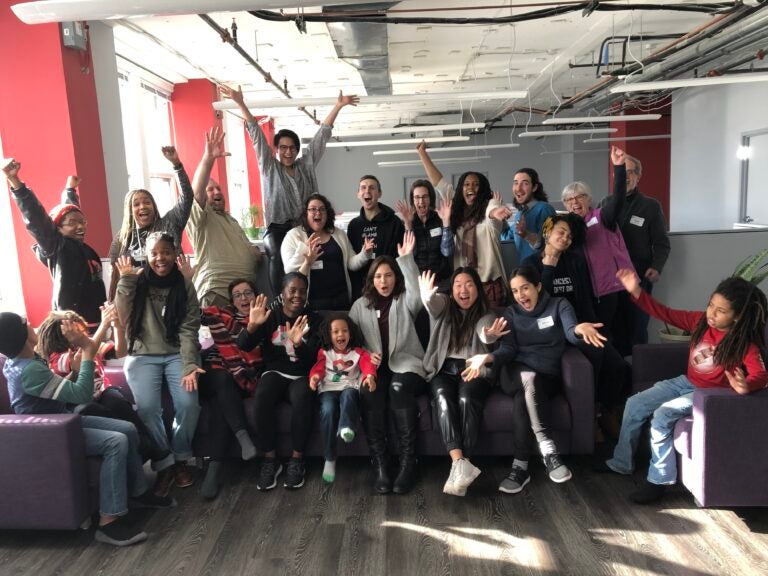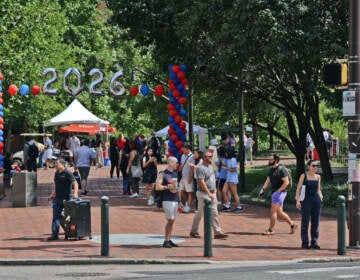Why we need community organizers in the time of COVID-19
Grants are available to groups organizing around the pandemic and to those struggling to operate in a changed environment or generate lost revenue.

Members of Bread & Roses Racial and Economic Justice Giving Project celebrating as they work to raise money for grassroots community organizing. (Bread and Roses) Bread and Roses.jpeg
Like business owners and nonprofit directors across the world, I faced a moment of panic when it became clear that we would have to close our physical offices in response to the COVID-19 crisis.
I was worried for our staff and for our organization’s future, of course. We’re dependent on donations from individuals, so an economic crisis that has everyone tightening their belts can be dangerous for our operations.
But I was also worried about something more. I work for Bread & Roses Community Fund, which is the leading funder in the Philadelphia region of grassroots community organizing for racial, social, and economic justice. And my immediate thought when the scale of the pandemic became clear was this — “We are going to need community organizing more than ever.”
Times of crisis typically illuminate and exacerbate the existing inequalities of our society. That’s what we saw happen with Hurricane Katrina, with the 2008 financial crisis, and with other disasters throughout history. This pandemic, and its economic fallout, is already landing hardest on those communities already targeted by systems of oppression. People of color, poor people, immigrants, people with disabilities, incarcerated people, people experiencing homelessness, and other marginalized communities are more likely to get sick, have worse health outcomes, lose their jobs, and not have the savings needed to make it through a period of joblessness.
The only sustainable way to overcome inequality and systems of oppression is through grassroots community organizing. That’s why Bread & Roses has been funding this work in the region for over 40 years. Just think about some of the issues that are now life-or-death to so many people: paid sick leave, access to health care, the rights of low-wage and gig economy workers, the rights of incarcerated people and undocumented immigrants, and the protection of voting rights. To the extent that we’ve seen any good things happen on these issues in the last generation — and there’s been some amazing victories! — it’s been due to years of hard work by community organizers.
Now those organizers are responding fast to COVID-19, and they’re already making an impact.
For example, we’re seeing criminal justice reform and immigrant rights groups push hard to release as many people as possible from jails and detention centers. Those jails and immigrant detention centers are terribly dangerous places during a pandemic. Thousands of people are trapped in close quarters, without access to health care or even soap and water in some cases.
We’ve seen other organizers successfully push large employers in the region to obey Philly’s paid sick law and actually pay their workers. That’s a great example of community organizers getting justice done when the city was unable or unwilling to enforce its own laws.
Other organizers are focused directly on how this crisis can impact our neighborhoods. Renters are among the most susceptible to financial disaster in this moment, as they got fewer protections in the government relief package and many have lost their jobs as the economy shuts down. Eviction of low income tenants can lead to developer-driven transformation of neighborhoods, so organizers in these neighborhoods are working to hold landlords accountable to a state court ruling that is supposed to freeze evictions through the crisis.
The work of these organizers is critical to ensuring a just and humane response from governments, corporations, and other institutions. And more is going to be needed as things get worse.
But as we looked around at the other philanthropic efforts underway in response to the crisis both nationally and locally, we saw a gap. Most of the other emergency funds that have arisen in the past several weeks have understandably focused on support for established nonprofits that are providing direct services — things like food pantries and senior services. That’s wonderful and vital work.
But it leaves out smaller and newer grassroots groups, and work focused on community organizing. Right now there are few other sources of funding for these groups, most of which operate on very thin budgets even when things are going well. Now with the economic shutdown, many of their donors can’t give.
So, working from our couches and kitchen tables, our team got to work. Every year, we raise every dollar that we give out in grants. So to respond to this moment, we immediately began raising money to launch our new Solidarity Fund for COVID-19 Organizing.
With generous gifts from the Samuel S. Fels Fund, Independence Public Media Foundation, and The Alfred and the Mary Douty Foundation, we’ve been able to raise an initial $350,000, although we need at least $500,000 to begin to address immediate needs in April. We plan to make grants of up to $10,000 to grassroots community organizing groups of all sizes. Grants will be available to groups specifically organizing around the pandemic and to those struggling under lost revenue or needing support to adapt to remote organizing during the lockdown.
This pandemic is a time of historic disruption and pain. If we’re not careful, it could also be a time of historic injustice. Philadelphia’s robust and dedicated network of community organizers will work hard to prevent that — but they need our help.
Casey Cook is the Executive Director of Bread & Roses Community Fund. You can learn more about the The Solidarity Fund for COVID-19 Organizing at https://breadrosesfund.org/solidarityfund.
WHYY is your source for fact-based, in-depth journalism and information. As a nonprofit organization, we rely on financial support from readers like you. Please give today.





![CoronavirusPandemic_1024x512[1]](https://whyy.org/wp-content/uploads/2020/03/CoronavirusPandemic_1024x5121-300x150.jpg)


